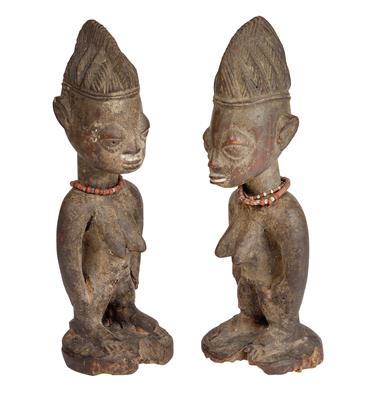Yoruba, Nigeria: A pair of unusually old twin figures 'Ibeji' (2 items), both female, with heavy traces of ritual offering. Style: Erin, Oyo.
Yoruba, Nigeria: A pair of unusually old twin figures 'Ibeji' (2 items), both female, with heavy traces of ritual offering. Style: Erin, Oyo.

Twins are regarded as something special in the culture of the Yoruba people. They have their own god, ‘Ere Ibeji’ and are worshipped in rituals. Furthermore, the Yoruba believe that twins only have one soul in common. If a twin dies, a vicarious figure, called ‘Ibeji’, must be manufactured by a professional carver. This guarantees that the soul is complete again. These figures are treated like living twins: they are washed, fed, adorned, sung to and honoured. The present ‘Ibeji’ pair stems from the region of Oyo (northwestern Yoruba region). Both female figures wear necklaces of small, white and red glass beads and display an old, in part lightly encrusted usage patina after years of ‘feeding’ and offering. The finely executed hairstyles were originally coloured blue by means of ‘bluing’. The remains of this are clearly visible. Striking are also the narrow lips of both 'Ibeji'. Age-related damage (breaks) on both rounded bases and small areas of loss in the lower region of the figures (old insect damage?). Overall an unusual, old ‘Ibeji’ pair. H: 26.5 cm and 26 cm. Between c. 1900 and the first third of the 20th century. (ME)
Provenance: Swiss Collection; Austrian Private Collection.
Lit.: ‘Ibeji. The Cult of Yoruba Twins’ by George Chemeche, fig. 81, 83, 85, 88.
Esperto: Prof. Erwin Melchardt
 Prof. Erwin Melchardt
Prof. Erwin Melchardt
+43-1-515 60-465
erwin.melchardt@dorotheum.at
02.11.2015 - 14:00
- Prezzo di partenza:
-
EUR 2.000,-
Yoruba, Nigeria: A pair of unusually old twin figures 'Ibeji' (2 items), both female, with heavy traces of ritual offering. Style: Erin, Oyo.
Twins are regarded as something special in the culture of the Yoruba people. They have their own god, ‘Ere Ibeji’ and are worshipped in rituals. Furthermore, the Yoruba believe that twins only have one soul in common. If a twin dies, a vicarious figure, called ‘Ibeji’, must be manufactured by a professional carver. This guarantees that the soul is complete again. These figures are treated like living twins: they are washed, fed, adorned, sung to and honoured. The present ‘Ibeji’ pair stems from the region of Oyo (northwestern Yoruba region). Both female figures wear necklaces of small, white and red glass beads and display an old, in part lightly encrusted usage patina after years of ‘feeding’ and offering. The finely executed hairstyles were originally coloured blue by means of ‘bluing’. The remains of this are clearly visible. Striking are also the narrow lips of both 'Ibeji'. Age-related damage (breaks) on both rounded bases and small areas of loss in the lower region of the figures (old insect damage?). Overall an unusual, old ‘Ibeji’ pair. H: 26.5 cm and 26 cm. Between c. 1900 and the first third of the 20th century. (ME)
Provenance: Swiss Collection; Austrian Private Collection.
Lit.: ‘Ibeji. The Cult of Yoruba Twins’ by George Chemeche, fig. 81, 83, 85, 88.
Esperto: Prof. Erwin Melchardt
 Prof. Erwin Melchardt
Prof. Erwin Melchardt
+43-1-515 60-465
erwin.melchardt@dorotheum.at
|
Hotline dell'acquirente
lun-ven: 10.00 - 17.00
kundendienst@dorotheum.at +43 1 515 60 200 |
| Asta: | Tribal Art |
| Tipo d'asta: | Asta in sala |
| Data: | 02.11.2015 - 14:00 |
| Luogo dell'asta: | Wien | Palais Dorotheum |
| Esposizione: | 28.10. - 02.11.2015 |
